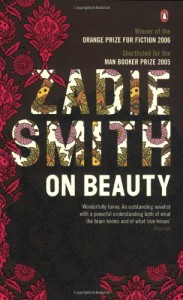Zadie Smith - On Beauty

Before we talk about Zadie Smith, let’s talk about me first. Here is something you should know – I was a serious book-worm up until I turned 16 (more or less) at which point I lost all interest in anything that wasn’t parties, boys, alcohol, drugs or sex. There, I said it. For the next five years my brain didn’t see much action (I somehow managed to finish high school and got accepted into the University of Warsaw but generally I found education a big distraction to my social life). I was about 21 when finally the fog surrounding my brain cleared a little and I decided to go to my local library. I had no idea what to read or how to choose. I was just browsing idly when I saw a book called ‘White Teeth’ with an interesting cover. I checked it out, went home and started reading. Soon I was mesmerized. I had no idea there were books like that, that there were stories like that and that people were telling them. I can’t quite recall now what it was about ‘White Teeth’ that spoke to me so but it was as if a curse was lifted and I could read and use my brain again.
For this OCD reason or another, a decade had to pass before I read another Zadie Smith’s book. I am more cynical now and not so easily impressed as I was back then. I felt l could see what Smith was doing there; I was onto all her tricks. Nonetheless, I enjoyed this book tremendously. All this mixing of race, politics, academia, art, love and death – what’s not to love? Even if some of the observations were not particularly revelatory to me I have to give it to Zadie – she knows how to write people. That’s what the characters in ‘On Beauty’ were – people, rather than characters. They were so well put together I feel I would recognize them if I chanced upon them at a party (you know, I still go to parties). Zadie Smith is at the same time cruel and merciful towards her subjects. She won’t hesitate to point out all the silliness of their lives but allows us to feel compassion for them and look upon their futile attempts to practice what they preach with forgiveness.
Also the climax was quite astonishing. I begin to believe that the ability to write a good climax, to make the reader understand you knew exactly what you were doing from page one is exactly what separates great writers from everybody else.
But we shouldn’t forget humour either:
‘[…] A brother don’t need a gate – he jumps the fence. That’s street.’
‘Again, please?’ said Howard.
‘Street, street,’ bellowed Zora. It’s like, “being street”, knowing the street – in Levi’s sad little world if you’re a Negro you have some kind of mysterious holy communion with sidewalks and corners.’
And descriptions. Here is my personal favourite (for obvious reasons):
The African women in their colourful kenti cloths, the whippet blonde with three phones tucked into the waistband of her trucksuit, the unmistakeable Poles and Russians introducing the bone structure of Soviet Realism to an island of chinless, browless potato-faces, the Irish men resting on the gates of housing estates like farmers at a pig fair in Kerry…
Bone structure! You can thank us for that later.
 10
10



